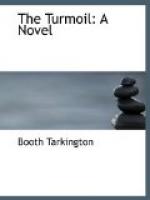Bibbs closed his note-book, replacing it in his trunk. Then, after a period of melancholy contemplation, he undressed, put on a dressing-gown and slippers, and went softly out into the hall—to his father’s door. Upon the floor was a tray which Bibbs had sent George, earlier in the evening, to place upon a table in Sheridan’s room—but the food was untouched. Bibbs stood listening outside the door for several minutes. There came no sound from within, and he went back to his own room and to bed.
In the morning he woke to a state of being hitherto unknown in his experience. Sometimes in the process of waking there is a little pause—sleep has gone, but coherent thought has not begun. It is a curious half-void, a glimpse of aphasia; and although the person experiencing it may not know for that instant his own name or age or sex, he may be acutely conscious of depression or elation. It is the moment, as we say, before we “remember”; and for the first time in Bibbs’s life it came to him bringing a vague happiness. He woke to a sense of new riches; he had the feeling of a boy waking to a birthday. But when the next moment brought him his memory, he found nothing that could explain his exhilaration. On the contrary, under the circumstances it seemed grotesquely unwarranted. However, it was a brief visitation and was gone before he had finished dressing. It left a little trail, the pleased recollection of it and the puzzle of it, which remained unsolved. And, in fact, waking happily in the morning is not usually the result of a drive home from a funeral. No wonder the sequence evaded Bibbs Sheridan!
His father had gone when he came down-stairs. “Went on down to ’s office, jes’ same,” Jackson informed him. “Came sat breakfas’-table, all by ‘mself; eat nothin’. George bring nice breakfas’, but he di’n’ eat a thing. Yessuh, went on down-town, jes’ same he yoosta do. Yessuh, I reckon putty much ev’y-thing goin’ go on same as it yoosta do.”




